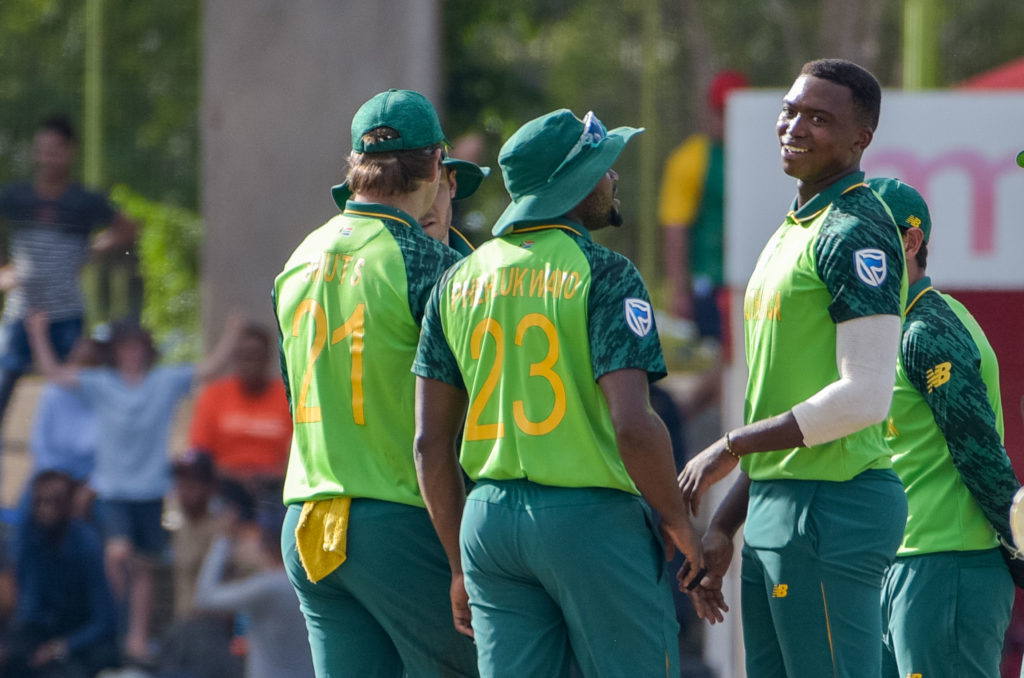Quinton de Kock’s failure with the bat proved a blessing in disguise for South Africa in the ODI series against Australia, writes JON CARDINELLI.
The Proteas beat Australia on Wednesday to take an unassailable 2-0 lead in the three-game ODI series. The result as well as the performance would have pleased coach Mark Boucher – who has been charged with reshaping the attitude of this side.
The Proteas made a strong statement when they won the first game of the series by 74 runs. All the talk in the buildup was about Quinton de Kock carrying the team’s hopes of success. When the captain was dismissed cheaply, however, the Proteas managed to crack on and post a formidable total of 291.
Keshav Maharaj summed up the mindset of the team when he fronted the media ahead of the second game. De Kock will be a key man for South Africa across all three formats for the foreseeable future. It’s good to know, however, that the likes of Heinrich Klaasen and David Miller also have the ability to bat the Proteas into game-winning positions, as they did in Paarl.
‘I think we’re coming out of the phase when it’s a one-man team,’ Maharaj said. ‘We play together as a team. Everyone is putting their hand up in various games, which is very important for us going forward.’
The bowlers certainly fired – as individuals and as a unit – in the first fixture of the series. Lungi Ngidi picked up three wickets, but there’s little doubt that the decision to go with two spinners – Maharaj and Tabraiz Shamsi – lent the attack more variety and potency.
David Warner and Aaron Finch went after the South African bowlers in the first powerplay at the Mangaung Oval. The Proteas showed remarkable skill and mettle to pull things back and limit Australia to 271.
Ngidi was once again the pick of the bowlers at the Mangaung Oval, finishing with career-best figures of 6-58. While the Proteas were without Kagiso Rabada – the leader of their attack – they managed to keep the pressure on the batsmen.
Ngidi and Anrich Nortje rattled the Aussie top order with a series of short and aggressive deliveries. Ngidi picked up the prize scalps of Warner, Steve Smith and Marnus Labuschagne in relatively quick succession.
The Proteas went into the second innings of the match in a powerful position. Crucially, they didn’t panic after De Kock was dismissed by Mitchell Starc for a duck.
Janneman Malan and Jon-Jon Smuts showed terrific patience and application to lay a platform. Subsequently, Malan and Klaasen, and then Malan and Miller clubbed together for a significant partnership.
Boucher would have been pleased to see other players taking responsibility. De Kock got a lot right in terms of his bowling changes and field placings. When he failed with the bat, several others took it upon themselves to win the match for South Africa.
I’m not suggesting that Boucher has got all the answers after one series victory against Australia. What the coach will know is that several other batsmen can step up when De Kock is dismissed early.
The limited-overs squad will be strengthened by the inclusion of Faf du Plessis, Rassie van der Dussen, Temba Bavuma and possibly AB de Villiers down the line. Some might see that as a problem, given the impressive displays by Klaasen, Malan and others in recent games. Boucher, on the other hand, will surely welcome that sort of selection headache.
Boucher will also know that Ngidi has what it takes to lead the attack in the absence of Rabada. The inclusion of two spinners – and a wrist- spinner in particular – could benefit the team when it competes at the T20 World Cup later this year.
Photo: Frikkie Kapp/BackpagePix







